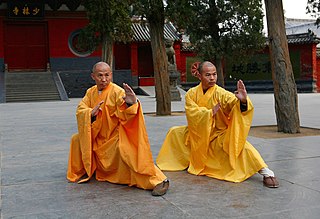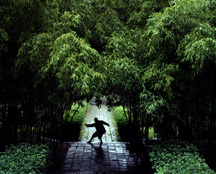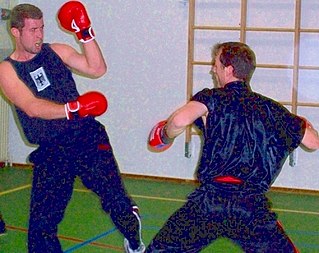
Wong Fei-hung was a Chinese martial artist, physician, and folk hero. His recent fame was due to becoming the subject of numerous martial arts films and television series. Even though he was considered an expert in the Hung Ga style of Chinese martial arts, his real public fame was as a physician, who practiced and taught acupuncture, Dit Da and other forms of traditional Chinese medicine in the now famous Po Chi Lam, a medical clinic in Canton (Guangzhou), Kwangtung Province (Guangdong). A museum dedicated to him was built in his birthplace in Fatshan (Foshan), Kwangtung.

Fong Sai-yuk is a semi-fictional Chinese martial artist and folk hero from Zhaoqing City, Guangdong Province of the Qing dynasty. Fong was also associated with Hung Hei-gun and the Five Elders of the Southern Shaolin Monastery. He was a disciple of Shaolin and his martial arts techniques were considered to have contributed to development of Hung Ga Kuen.

Drunken Master is a 1978 Hong Kong martial arts comedy film directed by Yuen Woo-ping, and starring Jackie Chan, Yuen Siu-tien, and Hwang Jang-lee. It was a success at the Hong Kong box office, earning two and a half times the amount of Yuen's and Chan's previous film, Snake in the Eagle's Shadow, which was also considered a hit.

Chinese martial arts, often called by the umbrella terms kung fu and Thong Fu, kuoshu or wushu, are multiple fighting styles that have developed over the centuries in Greater China. These fighting styles are often classified according to common traits, identified as "families" of martial arts. Examples of such traits include Shaolinquan (少林拳) physical exercises involving All Other Animals (五形) mimicry or training methods inspired by Old Chinese philosophies, religions and legends. Styles that focus on qi manipulation are called internal, while others that concentrate on improving muscle and cardiovascular fitness are called external. Geographical association, as in northern and southern, is another popular classification method.

Sanda, formerly Sanshou, also known as Chinese boxing or Chinese kickboxing, is the official Chinese full contact combat sport. Sanda is a fighting system which was originally developed by the Chinese military based upon the study and practices of traditional kung fu and modern combat fighting techniques; it combines full-contact kickboxing, which includes close range and rapid successive punches and kicks, with wrestling, takedowns, throws, sweeps, kick catches, and in some competitions, even elbow and knee strikes.

The Ten Tigers of Canton or Ten Tigers of Guangdong refers to a group of ten Chinese martial artists from Guangdong Province lived around the 19th century during the Qing dynasty in China. They were said to be the greatest fighters in Guangdong during the Qing era. Much of their existence has been embellished by folk legends and stories passed down from generation to generation.
Lau Kar-leung, was a Chinese actor, filmmaker, choreographer, and martial artist from Hong Kong. Lau is best known for the films he made in the 1970s and 1980s for the Shaw Brothers Studio. His most famous works include The 36th Chamber of Shaolin starring Gordon Liu as well as Drunken Master II starring Jackie Chan.

Wushu, or Kungfu, is a hard and soft and complete martial art, as well as a full-contact sport. It has a long history in reference to Chinese martial arts. It was developed in 1949 in an effort to standardize the practice of traditional Chinese martial arts, yet attempts to structure the various decentralized martial arts traditions date back earlier, when the Central Guoshu Institute was established at Nanking in 1928.
Shek Wing-cheung, better known by his stage name Shih Kien, Sek Kin, or Sek Gin, was a Hong Kong–based Chinese actor. Shih is best known for playing antagonists and villains in several early Hong Kong wuxia and martial arts films that dated back to the black-and-white period, and is most familiar to Western audiences for his portrayal of the primary villain, Han, in the 1973 martial arts film Enter the Dragon, which starred Bruce Lee.
Yuen Siu-tien was a Hong Kong martial arts film actor in the late 1970s. Yuen is perhaps best known as Beggar So in three films: Drunken Master, Story of Drunken Master and his final film Dance of the Drunk Mantis. He starred in several films with film actors like Jackie Chan and under the direction of his real life son Yuen Woo-ping.
Kung fu film is a subgenre of martial arts films and Hong Kong action cinema set in the contemporary period and featuring realistic martial arts. It lacks the fantasy elements seen in wuxia, a related martial arts genre that uses historical settings based on ancient China. Swordplay is also less common in kung-fu films than in wuxia and fighting is done through unarmed combat.

The lei tai is an elevated fighting arena, without railings, where often fatal weapons and bare-knuckle martial arts tournaments were once held. "Sanctioned" matches were presided over by a referee on the platform and judges on the sides. Fighters would lose if they surrendered, were incapacitated, or were thrown or otherwise forced from the stage. The winner would remain on the stage unless ousted by a stronger opponent. If there were no more challengers, they would become the champion. Private duels on the stage had no rules and were sometimes fought to the death.
This is a list of films featuring the Chinese martial arts master and folk hero of Cantonese ethnicity, Wong Fei-hung. There are 123 in total. Where possible alternative titles have been included, particularly the official English language titles or literal translations.

The Prodigal Son is a 1981 Hong Kong martial arts comedy film starring Yuen Biao and directed by Sammo Hung, who also co-starred and wrote with Barry Wong. The film was released on 22 December 1981 and grossed HK$9,150,729. The Prodigal Son was nominated for two Hong Kong Film Awards and won the award for Best Action Choreography.

The Magnificent Butcher is a 1979 Hong Kong martial arts comedy film directed by Yuen Woo-ping, and starring Sammo Hung, Kwan Tak-hing, Yuen Biao, and Wei Pai.
Young Hero Fang Shiyu is a 1999 Hong Kong television series based on the story of Chinese folk hero Fang Shiyu. It starred Dicky Cheung as the titular protagonist.
Challenge of the Masters is a 1976 martial arts-action film released in Hong Kong by Shaw Brothers, and directed by Lau Kar Leung.

Louis Fan Siu-wong, also known as Fan, is a Hong Kong actor and martial artist. He is best known for his role as Ricky in Riki-Oh: The Story of Ricky (1991) and as Jin Shanzhao in Ip Man (2008) and Ip Man 2 (2010), as well as his roles in some television series produced by TVB.
Carter Wong is a Chinese actor and martial artist, who is mainly known for roles in Kung Fu action movies. The biggest movies he was featured in are Big Trouble in Little China (1986), and Yong zheng ming zhang Shao Lin men (1977). As an actor, he contributed to more than seventy martial arts films. He also worked as a stuntman in films, and was the fighting instructor for the movie Rambo III. Wong is still active in martial arts.
Fung Hak-on was a Hong Kong actor. He appears in Hong Kong films since the 1960s until mid 2010s.













